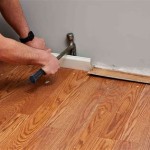Putting Down Flooring: Essential Aspects
Installing new flooring is a significant home improvement project that can enhance the aesthetic appeal and functionality of your living space. Whether you're tackling this project yourself or hiring a professional, it's crucial to grasp the essential aspects of putting down flooring to ensure a successful outcome.
Choosing the Right Flooring Material
The choice of flooring material depends on various factors, including durability, ease of maintenance, cost, and personal preference. Here are the most common types of flooring:
- Hardwood: Classic and timeless, hardwood offers beauty and durability.
- Laminate: A cost-effective and versatile option that mimics the look of hardwood or stone.
- Vinyl: Durable, waterproof, and available in a wide range of styles, vinyl is a popular choice for kitchens and bathrooms.
- Tile: Ceramic or porcelain tiles provide water resistance and are ideal for kitchens, bathrooms, and entryways.
- Carpet: Soft and comfortable underfoot, carpet adds warmth and soundproofing to a room.
Preparing the Subfloor
Before installing new flooring, it's essential to prepare the subfloor. This involves ensuring it's level, stable, and free of any debris or irregularities that could affect the flooring's performance. If any repairs or leveling are necessary, they should be addressed before proceeding with the flooring installation.
Selecting the Right Installation Method
Different types of flooring require specific installation methods. For example, hardwood and laminate flooring is typically installed using a floating floor system, while tile requires the use of mortar and grout. It's important to choose the appropriate installation method to ensure the flooring is properly secured and aligned.
Acclimating the Flooring
Most flooring materials need to be acclimated to the environment before installation. This allows them to adjust to the temperature and humidity levels of the space, reducing the risk of warping or buckling later on. The acclimation process varies depending on the flooring type and manufacturer's instructions.
Installing the Flooring
The actual flooring installation process will vary based on the material and chosen installation method. It's generally recommended to follow the manufacturer's instructions carefully and use the appropriate tools and materials for the task. If you're not confident in your abilities, it's advisable to hire a professional flooring installer to ensure a flawless outcome.
Finishing Touches
Once the flooring is installed, it's important to apply any necessary finishing touches, such as trim, molding, or baseboards. These elements not only enhance the aesthetic appeal of the flooring but also protect the edges and prevent moisture damage.
By following these essential aspects of putting down flooring, you can achieve a beautiful and durable flooring installation that will add value and enjoyment to your home for years to come.

How To Install Hardwood Flooring Step By Forbes Home

Laminate Floor Installation For Beginners 9 Clever Tips

How To Install Hardwood Flooring The Home Depot

How To Install Diy Glue Down Engineered Hardwood Flooring

How To Install Vinyl Plank Flooring As A Beginner Home Renovation

Concrete Makes Excellent Base For Laminate Flooring

How To Install Oak Hardwood Floors Young House Love Flooring Installing Laying

The Pros And Cons Of Plywood Floors A Erfly House

So You Re Thinking Of Installing Lifeproof Flooring Just Call Me Homegirl

Pergo Extreme Flooring Review What You Need To Know Reallyfloors America S Est Hardwood
Related Posts








